Did WRAP's Hospitality and Food Service Agreement serve up positive change?
Signatories to WRAP’s Hospitality and Food Service Agreement (HaFSA) reduced their food and packaging and waste arisings by 11 per cent against a target of five per cent over its three-year span, while missing a target to improve the sustainable management of waste.
 In total, 95 signatories, including fast food and coffee chains, restaurants, large-scale catering companies, hotels, universities and brewers, signed up to the commitment, managed by the Waste & Resources Action Programme (WRAP), which ran for a three-year period from 2012 to 2015.
In total, 95 signatories, including fast food and coffee chains, restaurants, large-scale catering companies, hotels, universities and brewers, signed up to the commitment, managed by the Waste & Resources Action Programme (WRAP), which ran for a three-year period from 2012 to 2015.
The agreement was established after WRAP research found that in 2011, the hospitality sector produced nearly one million tonnes of food waste – equivalent to more than 1.3 billion meals – at a cost of £2.5 billion, while 1.3 million tonnes of packaging were wasted by the sector. Especially concerning was that 78 per cent of the residual waste was made up of easily recyclable food, paper, card and glass.
WRAP subsequently established the agreement, which asked signatories to aim towards two targets:
- to reduce food and associated packaging waste arising by five per cent by the end of 2015 (measured by CO2 equivalent emissions against a 2012 baseline); and
- to recycle, compost or send to anaerobic digestion at least 70 per cent of food and packaging waste by the end of 2015.
Waste reduction
WRAP reports that signatories sent 31,000 tonnes less waste to landfill in 2015 than the baseline recorded in 2012, saving 80,000 tonnes of CO2-equivalent emissions.
The agreement saw the creation of a food waste prevention working group and the development and delivery of training throughout the sector. A best practice guide for the sector was also created while work was also done with the signatories to monitor and measure their food waste and highlight its cost to drive changes in improving operational efficiency.
Over the three years, WRAP says that food waste prevention activities saved an estimated 24,000 tonnes of food from being thrown away, the equivalent to 48 million meals. It estimates that this food waste mitigation has had an overall value to businesses of around £67 million. Redistribution of surplus food also doubled throughout the course of the agreement to 760 tonnes, which is enough to make to 1.5 million meals.
Waste management
While reductions in the level of waste arising hit the targets set in 2012, the second goal of sustainably managing 70 per cent of food and packaging waste across the range of signatories was missed by some distance, with the final rate in 2015 hitting 56 per cent (up a third from the 2012 rate of 42 per cent).
WRAP says that ‘good progress’ has been made on the ‘ambitious’ target, but that the length of time required to implement new contracts and incorporate food waste collections into operations contributed to it not being met.
 In summarising the work done to improve the management of food waste, WRAP noted that a waste management working group created for the agreement had produced a best practice guide and offered technical support to businesses to review their existing waste management services and assist in developing new schemes through contract clauses for recycling collections.
In summarising the work done to improve the management of food waste, WRAP noted that a waste management working group created for the agreement had produced a best practice guide and offered technical support to businesses to review their existing waste management services and assist in developing new schemes through contract clauses for recycling collections.
Reflecting on the work made towards the target, Steve Creed, Director of Business Programmes at WRAP, said: “While it’s disappointing not to have met the waste management target in full, big improvements have been made. To see food waste recycling increase by more than half and packaging recycling at nearly 70 per cent for signatories is very impressive. And nearly 100,000 tonnes of food and packaging waste has moved up the waste hierarchy to recycling.”
Results to be built on by Courtauld 2025
Commenting on the three-year agreement as a whole, Creed said: “I am delighted with the achievements of the HaFSA signatories. The sector has taken huge strides implementing measures to prevent food waste and realised individual and sector-wide benefits.
“The HaFSA has proven to be a catalyst for industry, providing the motivation and inspiration to help big changes happen in the way the sector does business, and saving it money at the same time. The next step is to build on this good work with Courtauld 2025 and have more businesses working in collaboration to make resource efficiency central to how our supply chain operates, from farm to fork.”
The Courtauld Commitment 2025 was launched by WRAP last March as a successor to its three-part Courtauld Commitment. Taking a wider view of the food waste supply chain, the commitment is challenging UK food retailers, brands, food service companies, trade bodies and local authorities to reduce resource intensity by 20 per cent per capita in 10 years and save an estimated £20 billion.
WRAP says that a number of HaFSA signatories are already engaged in working groups for Courtauld 2025 and are piloting an approach to help the sector monitor and measure food surplus, which is expected to be rolled out in 2017.
WRAP itself played a part in developing the Food Loss and Waste Accounting and Reporting Standard, a tool to help companies and governments account for and assess their food waste. The standard was created by a partnership convened by the World Resources Institute, where former WRAP CEO Liz Goodwin is now Director of Food Loss and Waste.
The tool has already been piloted by Courtauld 2025 signatory Nestlé, which found that 15 to 19 per cent of fresh milk in Pakistan was wasted on its way to the market. The pilot saw this this figure reduced to 1.4 per cent after the introduction of cooling storage to villages.
A full report into the results of the Hospitality and Food Service Agreement can be downloaded from WRAP’s website.







